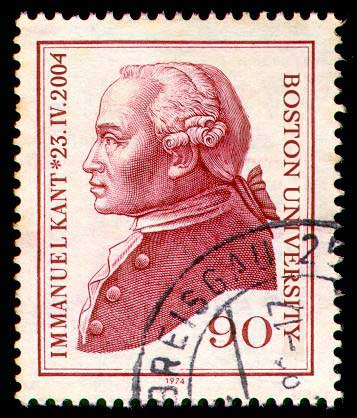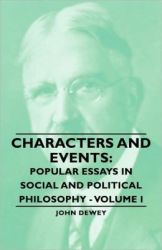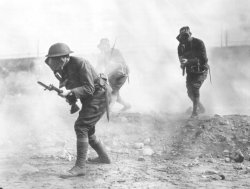1924 was the 200th anniversary of the birth of German philosopher Immanuel Kant, and American philosopher John Dewey was writing a series of essays reflecting on philosophy and current events. The series was published in book form in 1929 as Characters and Events: Popular Essays in Social and Political Philosophy.
Here are a few striking excerpts about the significance of Immanuel Kant.
One is about whether the philosophy of Kant is partly responsible for World War I: “It is possible that the Great War was in some true sense a day of reckoning for Kantian thought” (68).
How is that possible, since Kant died over a century before the great conflict between the German-led Central powers and the Allies?*
Dewey’s response begins with describing Kant as “the thinker who for the past seventy-five years supplied the bible of German thought” (63).

The Kantian “bible’s” core themes were skeptical, idealist, and duty-based:
“Kant to himself and to many in his own day was a revolutionary. There is no valid intellectual access, he taught, to the things of ultimate importance to man, the things with which traditional philosophy has been preoccupied, God, the soul, immortality, even the universe as an objective single whole. From this standpoint, all previous philosophy had been on the wrong track; it had been attempting the impossible” (65).
Dewey then connects that Kantian idealistic philosophy to the major thinkers in subsequent generations of German thought — Fichte (d. 1814), Hegel (d. 1831), Treitschke (d. 1834), Nietzsche (d. 1900). For example:
“That Treitschke had assumed a philosophy of the state and history distilled by Hegel and Fichte from idealistic philosophy, and given it and acrid positivistic application to contemporary affairs, was unnoted. In vain were the allusions of Bernhardi to the categorical imperative and the idealistic mission of Germany spread over his pages” (135).
Also striking is Dewey’s attention to the impact of German philosophy on British intellectual life in the fifty years leading up to the War. Dewey notes “the immense interest taken in professional German philosophy in the generation after 1870 — the generation of revolt against the empiricism that reigned in Great Britain from Locke onwards” (137-138).
That immense interest, according to Dewey, was not only abstract-theoretical but activist-applied:
“German philosophy was seized upon as a weapon with which to attack the former official philosophy of England. It is more than a coincidence that the reign of German idealism in Great Britain coincided with the revolt against laissez-faire liberalism in economics and politics, and with the growth of collectivism … . Consequently the English attitude was not concerned with what German idealism meant at home, but with what it could do in Great Britain. Everything which did not contribute to this end was ignored, or else treated as a mere technical blemish without serious import” (138-139).
So: a provocative attempt to work out connections between philosophy and politics by a major thinker grappling with the after-effects of the devastation of the First World War.
Source: John Dewey, Characters and Events: Popular Essays in Social and Political Philosophy, Vol. I. Joseph Ratner, Ed. Henry Holt and Company: New York, 1929.
Related: More of my posts on Immanuel Kant.
[* Changed to “Central” from “Axis”. Thanks to Todd Myers for catching that.]


And Dewey will be credited with the Destruction of American Education and History, and maybe WWIII. I wonder if there will be any one left who can still write?
Hi Glenn: Can you clarify your point? Is it that no philosopher can or should be connected to events like World War I? Or is it that Dewey is wrong in trying to connect Kant in particular to it?
I think Glenn is taking shots at Dewey, not Dewey’s analysis of Kant.
Confusing. He seems to see moral duty to the collective (I guess nationalistic collective) as driving German aggression? And sees this philosophy as damaging to England as well (though I do not see the relevance to the war in that). Yet, Dewey seems a collectivist himself, urging institutions and social practices that create the proper democratic consensus? Or does he see democracy as a manifestation of individualism (but only with the proper socializing)?